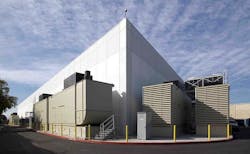Power constraints around Dublin have cramped the ambitions of a number of data center operators seeking to expand in the area, prompting a bankruptcy, a lawsuit, and a debate over which governmental entities should set policy for data center development in major tech corridors. Meanwhile, Eirgrid last week issued an “amber alert” for the Irish grid due to reduced generation of wind power.
We covered the Dublin power crisis in some depth in a story last month on DCF. After years of expansion, the growth of data center construction near Dublin has been effectively capped by Ireland’s grid regulator operator, forcing utility Eirgrid to halt talks on about 30 proposed projects.
We’ve noted that power constraints in Dublin, Northern Virginia and other markets pose a major challenge to the long-term growth of the Internet. The inability to acquire power for expansion is now having commercial consequences in Ireland. Here are several relevant developments/
Dataplex Group Seeks Liquidation
In August 8, DCD reported that Dataplex Group has pursued a liquidation after waiting for 12 months for grid power approval for its Dublin-area projects.
“Unfortunately, Dataplex Group has entered into voluntary liquidation, due to being refused power contracts from Eirgrid, the National Grid provider, for two projects in Dublin,” said Dataplex Co-founder and CEO Eddie Kilbane. “This was too much for the investors to take as we had spent a lot of money to get to the position for our applications to be refused, this was after 12 months waiting for an answer and with full technical approvals from Eirgrid.”
Dataplex is an experienced data center development firm backed by Chirisa Investments, which last year took on additional investment from Dubai-based conglomerate DAMAC. It previously bought and redeveloped an office development in Dublin into a 10-megawatt data center, which was acquired by Keppel Group in 2017.
Legal Challenge from Echelon Data Centres
A recent decision by the South Dublin County Council to ban new data center development through 2028 is being challenged in court by Echelon Data Centres, which asserts that the ban is unlawful and should be set aside. The Irish government has also objected, ordering the South Dublin council to reverse the ban, saying it breaches national and regional policy.
Sough Dublin County Council includes Grange Castle and Clondalkin, home to large data center campuses for Google and Microsoft, among other data center firms. Echelon owns lands in Clondalkin and Newcastle Co. Dublin which are within the council’s functional area which are the subject of planning permissions for data center development.
Ireland’s prime minister, Taoiseach Micheál Martin, recently said there “can’t be a moratorium” on digital infrastructure. On July 27, the Irish government released its policy statement on the role of data centers in the country’s economy and power grid, which states a “preference” for facilities that boost economic activity, embrace sustainability strategies, and reduce their impact of the grid.
But an AWS Project Gains Approval
While South Dublin has ban on new data centers, their neighbors at the Dublin City Council have just granted Amazon permission to build two AWS data centers at the Clonshaugh Business and Technology Park in North Dublin. AWS already has a data center in operation at the park.
While Eirgrid is limiting new connections, it has also said existing projects will move forward, and are expected to add at least 800 megawatts of additional capacity in the Dublin region through 2026. It is not immediately clear where this AWS project stands on that timeline.
The approval of the Amazon project was opposed by local environmental groups, and prompted the spokesperson for the Social Democrats party to call for a moratorium on new projects while there is a deeper assessment of the challenges facing the Irish electrical grid.
Those concerns were heighted last week by two days of amber alerts, which Eirgrid attributed to “forced outages at a number of generators, low wind generation and limited electricity imports.”
“The alert means that the buffer between the demand for electricity and the available supply is currently smaller than optimum,” Eirgrid said. It does not indicate a loss of electricity supply to customers.”
The grid operator is in the midst of “Powering Up Dublin”, a project to study and improve grid access and reliability in the region.






